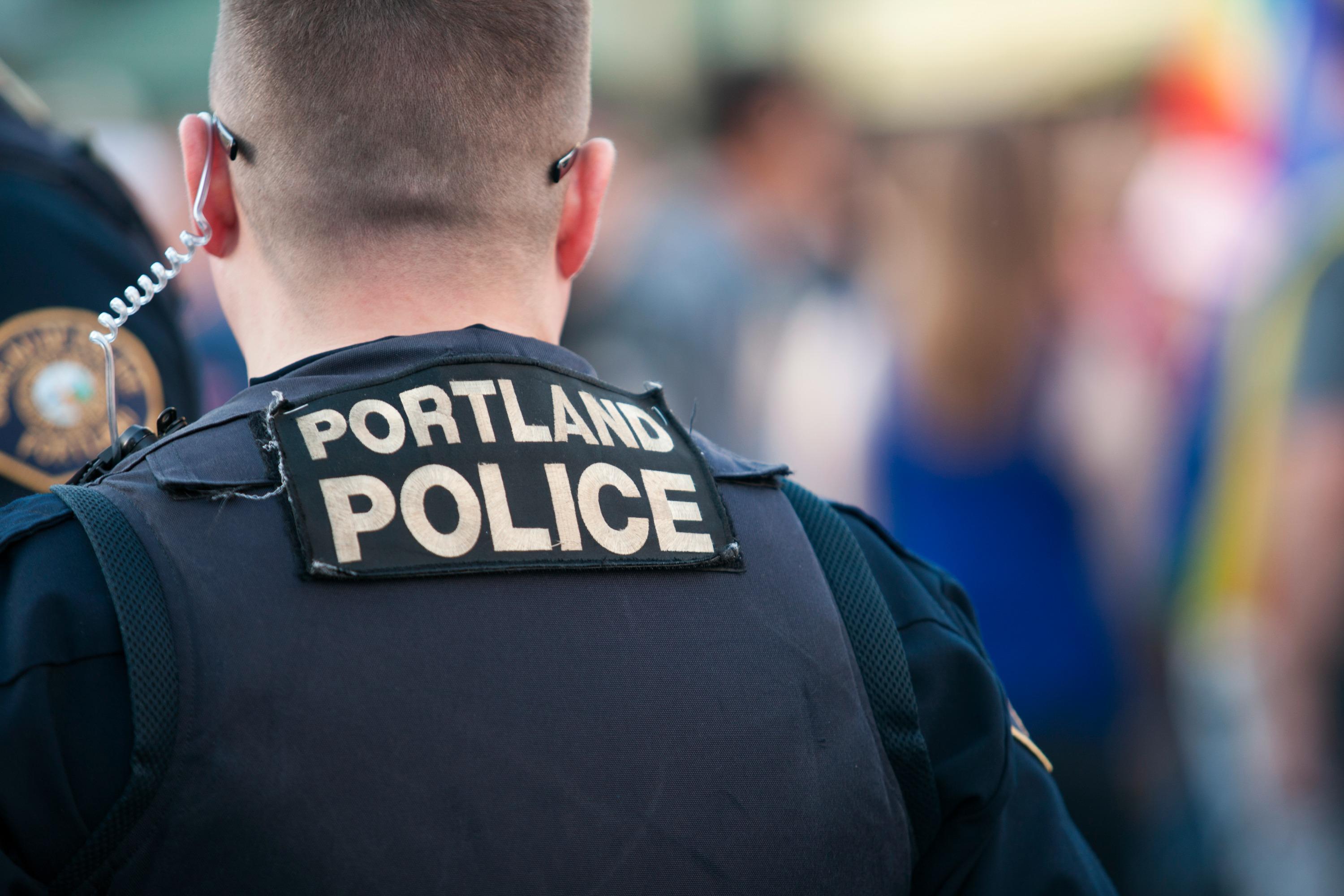
The city estimates being ready to equip all officers with body-worn cameras no later than next fall.
Bryan M. Vance / OPB
Portland is one step closer to equipping its entire police force with body-worn cameras.
City Council on Wednesday gave the city’s purchasing department permission to spend up to $2.6 million on a contract with Axon Enterprises, a top provider of body-worn cameras to law enforcement agencies across the country. The contract would allow the city to purchase body cameras for all sworn officers, along with the technology needed to process and store all footage.
“This is an important step forward for the city of Portland. It’s long overdue,” said Commissioner Rene Gonzalez. “It is imperative in addressing police accountability.”
Portland is the largest police department in the country without a body-worn camera program. While a federal judge has urged the city to adopt body cameras for nearly a decade, the rollout was stalled by policy disagreements until earlier this year.
The council vote follows a two-month pilot program with Axon, which equipped 150 officers assigned to the Central Precinct and gun violence team with cameras. Wednesday’s vote paves the way for the city to equip the estimated 650 remaining sworn officers with cameras within the next year.
Tammy Mayer, who manages the body-worn camera program for the Portland Police Bureau, characterized the pilot program as a success.
“The pilot gave us not only the opportunity to test the equipment, the cameras, the mounts and such, but it also gave us the opportunity to test the back office software, both from an officer perspective and from a professional staff perspective of running the system.” Mayer told commissioners. ”The software worked really well and the equipment worked really well. We have no concerns at this time.”
The pilot program ended on Oct. 19. The mayor’s office did not respond to an inquiry about whether the participating officers will continue to wear cameras now that the pilot has ended.
The city of Portland and the Portland Police Association created a policy governing the pilot program in April, after years of tense negotiations. The two parties were split on when officers would be able to view their camera footage. The union wanted officers who use any kind of force against a member of the public to be able to review footage before writing a report about the incident. The city wanted officers to submit a report before viewing footage.
The agreed-upon policy prevents officers from immediately reviewing their camera footage for cases involving a death. An officer is only able to view their footage after giving an on-scene statement to their supervisor and being interviewed by an internal affairs investigator. That investigator is also barred from viewing the officers’ footage before interviewing them.
According to the policy, an officer can clarify any discrepancies between their body camera footage and their initial statement after viewing the recording.
Officers who witness another officer using deadly force are allowed to view their camera’s footage before providing a statement.
Officers who use non-lethal force, like pepper spray or impact munitions, will also be required to provide an on-scene statement to a supervisor before viewing their camera footage.
The policy requires officers to turn their cameras on whenever they’re dispatched to a call. The cameras also automatically begin recording whenever officers draw their weapons or activate their vehicle’s flashing lights.
At the end of their shifts, all officers must upload their camera footage to a cloud service, managed by Axon.
This policy may be adjusted to meet the needs of a citywide body-worn camera program. Per the city’s initial agreement with the police union, both parties must meet following the conclusion of the pilot program to discuss any “mutually agreeable modifications” to the policy. According to the mayor’s office, “the city is complying with that obligation.” But it’s not clear what changes, if any, may be proposed.
Aaron Schmautz, president of the Portland Police Association, said there are a “handful” of issues that came up during the pilot program that the union hopes to quickly iron out with the city.
“Primarily the issues surrounded when cameras should be activated while responding to non emergency calls, which non police action needs to be recorded, notification processes, and how to ensure video can be downloaded in an expedient manner to ensure they are available for use,” Schmautz said.
Portland is one of many jurisdictions that rely on body cameras made by Axon Enterprises, an Arizona-based company that also sells Taser-brand weapons, cameras and records management software. The Clark County Sheriff’s Office hired Axon to operate its body-worn camera program in June.
The funding for the $2.6 million contract was set aside in the city’s budget in fall of 2021. The city has spent just over $37,000 of those funds since then, largely on the pilot project. The total cost includes training officers on the body camera policy.
Portland is required to adopt a body camera policy under the settlement agreement between the city and the U.S. Department of Justice based on excessive police use of force. Federal prosecutors who oversee the settlement have demanded a policy that bars police officers from viewing footage before making a statement.
Those prosecutors gave the city’s policy for its pilot camera program conditional approval in April. If the city and the police union decide to tweak that policy in the coming months, they will need an additional sign-off from federal prosecutors.
It will still take nearly a year before the citywide program is off the ground. The city estimates being ready to equip all officers with body-worn cameras no later than next fall.
“I want to just caution the public,” said Mayor Ted Wheeler. “It’s going to take some time for us to phase in the rollout of body cameras and make sure that everybody has sufficient training and sufficient understanding of how these tools will work.”

